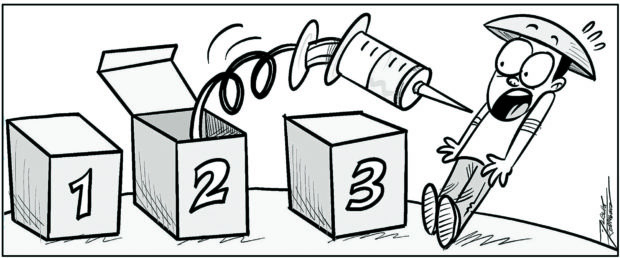Respect informed consent
Sites offering the Pfizer anti-COVID-19 vaccine this week were a startling picture of chaos and frayed nerves. With a few thousand slots around the metropolis available for Pfizer shots, folks in different Metro Manila cities flocked to the sites even if many of them had no appointments or notifications. This resulted in widespread confusion and the breaking of health protocols like physical distancing.
In Manila, thousands lined up as early as 3 a.m. for a chance to get one of the 900 available doses, a development that Mayor Isko Moreno described as a “setback.” In Parañaque, where 2,000 slots were available, a resident described the winding queues as “like an octopus,” airing concern about seniors and the wheelchair-bound being exposed to the virus. Meanwhile, 18 other sites in Manila offered Sinovac, where, per a report, “queues were a lot shorter throughout the day.”
Article continues after this advertisementIf anyone needed any proof that Filipinos’ vaccine hesitancy is based not just on superstition or gossip, the clear preference for Pfizer (and perhaps other vaccine brands from the West) shows that some of it is at least based on considered opinion. On top of widespread distrust of Chinese vaccines, which were the first to become available in the country, Filipinos as a whole have been hesitant to get the COVID-19 shots. The most recent Pulse Asia survey shows that 61 percent of respondents would refuse to get vaccinated, an increase from 47 percent last January. Only 16 percent of respondents said they would go for a vaccine shot, while 23 percent said they “cannot say” if they would get the shot if it were made available.
Why the reluctance? Some 84 percent said it was concerns about safety that would keep them from receiving the jab, while 7 percent cited vaccine efficacy and 6 percent said they just didn’t think a vaccine was necessary.
It wasn’t always this way. A study conducted by a team from the Ateneo School of Government and the Ateneo School of Medicine and Public Health found that as recently as 2015, 93 percent of Filipinos strongly agreed that vaccines were important. But by 2018, at the height of the controversy over the anti-dengue Dengvaxia vaccine, public confidence in vaccines plummeted to 32 percent. Compliance with childhood vaccinations dropped precipitously as well.
Article continues after this advertisementPolitics fanned and abetted the hysteria and misinformation surrounding Dengvaxia. But, while politics is intertwined with public health, “it must not compromise nor encumber public health, and instead support it,” said the Ateneo study authors.
What government must do, they added, is rehabilitate “what is left of the public’s trust through consistent messaging, transparency, and respect for science.”
Has the government done this adequately, or at all, in the present case? The Department of the Interior and Local Government announced in February that it was launching an intensified public information drive “in partnership with local government units and uniformed personnel.” But there are more designated spokespersons in the administration’s anti-communist task force (eight as of last count) than in any visible and sustained nationwide information drive to regain the people’s faith in vaccines.
Instead of working on that vital civic task, President Duterte has once again chosen a draconian, ill-considered approach. People would no longer be told beforehand what vaccine they were to receive, he declared, with folks at best told just before receiving their shots. According to Health Undersecretary Myrna Cabotaje: “If they want to be vaccinated, they should go to the facility or vaccination site and whatever vaccine is available is the one they will receive.”
Would such a policy encourage people to wake up early in the morning, brave the heat and the crowds, on the off-chance they would be getting the vaccine of their choice, which is, after all, their human right? (Mr. Duterte himself enjoyed the privilege of choice, going for the Chinese brand Sinopharm—a vaccine still unapproved in the country.) True, at this point, all approved and certified vaccines would provide some measure of protection against COVID-19, which would in turn lead to protection for the greater public. But depriving people of information would not foster confidence. It could, instead, result in greater suspicion, fear, and cynicism among them.
“The principle of informed consent is so fundamental in medical ethics and I am shocked that the DOH wants Filipinos to sign up for vaccination not knowing which brand they’ll get,” protested medical doctor-anthropologist and Inquirer columnist Gideon Lasco in a tweet—just one of many to see the rashness and folly of the government’s latest move. “If we are to build vaccine confidence and empower the people, they need more information, not less.”
For more news about the novel coronavirus click here.
What you need to know about Coronavirus.
For more information on COVID-19, call the DOH Hotline: (02) 86517800 local 1149/1150.
The Inquirer Foundation supports our healthcare frontliners and is still accepting cash donations to be deposited at Banco de Oro (BDO) current account #007960018860 or donate through PayMaya using this link.

















